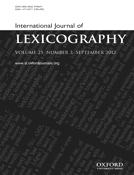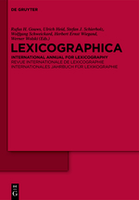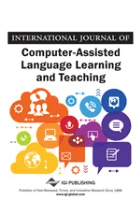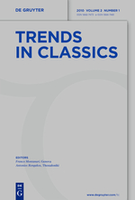
INTERNATIONAL JOURNAL OF LEXICOGRAPHY
metrics 2024
Shaping the Future of Language Documentation
Introduction
INTERNATIONAL JOURNAL OF LEXICOGRAPHY is a leading scholarly platform in the domain of linguistics and language studies, published by Oxford University Press, a renowned publisher known for its contributions to academic excellence. With an ISSN of 0950-3846 and E-ISSN 1477-4577, the journal has established a robust international presence since its inception in 1988, converging its scholarly reach and insights for over three decades. The journal is highly regarded within its field, currently holding a prominent Q2 quartile ranking in Linguistics and Language and ranking #200 out of 1088 in the Scopus database within the Arts and Humanities domain, which places it in the 81st percentile of its category. Although the journal does not offer open access, it remains an invaluable resource for researchers, professionals, and students dedicated to advancing the study of lexicography. Key objectives of the journal include fostering innovative research, facilitating interdisciplinary dialogue, and providing a forum for the dissemination of significant findings contributing to lexicon development and language use worldwide. The INTERNATIONAL JOURNAL OF LEXICOGRAPHY serves as a vital conduit for scholarly discussions, ensuring that critical insights and discussions in lexicography continue to thrive in the academic landscape.
Metrics 2024
 0.32
0.32 0.80
0.80 0.90
0.90 34
34Metrics History
Rank 2024
Scopus
IF (Web Of Science)
JCI (Web Of Science)
Quartile History
Similar Journals

Quaderns de Filologia-Estudis Linguistics
Advancing Linguistic Insights, One Study at a Time.Quaderns de Filologia-Estudis Linguistics is a distinguished open-access journal published by the Universitat de València, Facultat de Filologia, specializing in the study of linguistics and language. With its ISSN 1135-416X and E-ISSN 2444-1449, this journal has been a valuable resource for scholars in the field since its transition to open access in 2012. Located in Valencia, Spain, it contributes significantly to the discourse within the Linguistics and Language category, currently holding a Q3 quartile ranking as per Scopus. The journal is dedicated to the dissemination of innovative research findings and theoretical discussions, ensuring that both emerging and established scholars have a platform for their work. Its inclusive scope and commitment to quality research help navigate the complex landscape of linguistic studies, making it an essential resource for researchers, professionals, and students alike. With converged years covering from 2019 to 2023, Quaderns de Filologia continues to foster a vibrant academic community, encouraging submissions that advance the field of linguistics.

LEXICOGRAPHICA
Pioneering Insights in Linguistics and LexicographyLEXICOGRAPHICA, published by WALTER DE GRUYTER GMBH, stands as an invaluable resource in the field of linguistics and language studies. With an ISSN of 0175-6206 and an E-ISSN of 1865-9403, this esteemed journal has garnered a solid reputation, reflected in its position within the Q2 quartile for linguistics and language as of 2023. Hailing from Germany, and with a robust publication history spanning from 1996 to 2023, LEXICOGRAPHICA offers a platform for scholarly discourse and innovative research concerning lexicography and its intersections with other linguistic fields. Ranked #442 in Arts and Humanities and #516 in Social Sciences by Scopus, it occupies a pivotal space in academic literature, making it essential reading for researchers, professionals, and students committed to advancing their understanding of language documentation and analysis. Although not open access, the journal’s commitment to high-quality peer-reviewed content ensures that it remains a respected outlet for original research, critical evaluations, and discussions that shape the future of lexicographic studies.

Studia z Filologii Polskiej i Slowianskiej
Bridging Disciplines in Linguistics and Cultural NarrativesStudia z Filologii Polskiej i Slowianskiej is a prominent journal published by the Polish Academy of Sciences, Institute of Slavic Studies, focusing on the rich and diverse field of linguistics and language studies, particularly within the Slavic context. With the ISSN 0081-7090 and E-ISSN 2392-2435, this open-access journal has been a valuable resource for researchers, professionals, and students since its transition to an open-access model in 2014. It features rigorous peer-reviewed articles that contribute to the understanding of linguistic phenomena and cultural narratives across Slavic languages. Recognized within the Q3 quartile of linguistics and language in 2023, it ranks at the intersection of arts, humanities, and social sciences, providing insights that echo through disciplines such as sociolinguistics, psycholinguistics, and philology. In its ongoing publication trajectory from 2011 to 2023, Studia z Filologii Polskiej i Slowianskiej continues to foster academic discourse and collaboration, positioning itself as a key player in the global linguistic community.

Revue Roumaine de Linguistique-Romanian Review of Linguistics
Unraveling the Complexities of Language.Revue Roumaine de Linguistique-Romanian Review of Linguistics, published by EDITURA ACAD ROMANE, is a distinguished journal dedicated to advancing the field of linguistics and promoting scholarly discourse in language-related research. With its ISSN 0035-3957, this journal has established itself as a valuable resource for researchers and practitioners alike, particularly within the linguistics and language categories where it holds a respectable Q3 ranking as of 2023. The journal covers a wide array of topics, focusing on both theoretical and applied linguistics, making it an essential platform for those interested in the latest developments, methodologies, and findings in the field. Although it currently does not operate under an open access model, the Romanian Review of Linguistics remains an impactful publication with its regular convergence of years from 2010 to 2023, providing a comprehensive archive for ongoing research endeavors. With its address located in Bucuresti, Romania, this journal continues to foster a vibrant academic community and supports the ongoing exploration of linguistic phenomena across diverse contexts.

MUTTERSPRACHE
Showcasing Pioneering Research in LinguisticsMUTTERSPRACHE is a prominent journal published by GESELLSCHAFT DEUTSCHE SPRACHE, focusing on the fields of linguistics and language studies. Based in Wiesbaden, Germany, this esteemed publication brings together a diverse spectrum of research articles, reviews, and discussions that delve into both the theoretical and practical aspects of language use. With the ISSN 0027-514X and notable inclusion in Scopus rankings, it stands at Q3 in Linguistics and Language for 2023, reflecting its relevance in academia. Though not an Open Access journal, *MutterSprache* offers a valuable repository of knowledge for researchers, professionals, and students interested in the nuances of German language and broader linguistic phenomena. The journal has been converging its scope from 2002 to 2024, ensuring a comprehensive exploration of evolving language trends and linguistic research methodologies.

International Journal of Computer-Assisted Language Learning and Teaching
Enhancing learning experiences through technology.Welcome to the International Journal of Computer-Assisted Language Learning and Teaching, a premier publication by IGI Global dedicated to advancing the interdisciplinary research at the intersection of linguistics, education, and computer science. With an ISSN of 2155-7098 and an E-ISSN of 2155-7101, this journal aims to provide a platform for innovative studies on the implementation and effectiveness of technology in language learning and teaching. The journal has earned notable recognition within its field, securing a Q1 ranking in Linguistics and Language and strong placements across several categories in the 2023 Scopus Ranks, including a Q3 classification in Computer Science Applications and Computer Vision and Pattern Recognition. Researchers and educators are encouraged to contribute their findings to foster dialogue around effective computer-assisted methodologies and instructional practices. Although the journal is not open access, it remains a vital resource for researchers, professionals, and students seeking to enhance the efficacy of language education through technological innovation.

REVUE DE LINGUISTIQUE ROMANE
Unveiling the Nuances of Romance LanguagesREVUE DE LINGUISTIQUE ROMANE, published by the esteemed SOCIÉTÉ LINGUISTIQUE ROMANE, is a prominent academic journal dedicated to the exploration of Romance linguistics. With its ISSN 0035-1458, the journal plays a significant role in advancing knowledge within the fields of linguistics and the history and philosophy of science. Although it does not currently offer Open Access, it provides critical insights and peer-reviewed research that are indispensable for scholars, educators, and students interested in the nuances of Romance languages. The journal, which has seen converged coverage from 2006 to 2017, and then again from 2019 to 2021, is ranked in the third quartile (Q3) across various categories within Scopus, reflecting its established presence in the academic community. As a vital resource for interdisciplinary studies, REVUE DE LINGUISTIQUE ROMANE is instrumental for those seeking to deepen their understanding of linguistic structures, cultural nuances, and the historical development of Romance languages.

Philologica Canariensia
Advancing interdisciplinary dialogue in literature and linguistics.Philologica Canariensia is a distinguished academic journal published by the University of Las Palmas de Gran Canaria, focusing on the vibrant fields of Literature and Literary Theory as well as Linguistics and Language. With an impact factor that positions it in the Q1 and Q2 quartiles in its respective categories as of 2023, the journal has established itself as an important platform for scholarly communication and research. Since transitioning to Open Access in 2014, it has broadened its reach, allowing researchers, professionals, and students from around the globe to access high-quality publications without barriers. With a commendable presence in Scopus rankings, including a rank of #309 out of 1106 in Literature and Literary Theory, Philologica Canariensia aims to foster an interdisciplinary dialogue and advance knowledge in the humanities. The journal's commitment to publishing innovative research makes it an essential resource for anyone engaged in exploring linguistic and literary phenomena.

Rasprave
Unlocking the potential of language through open access research.Rasprave is a distinguished open access journal published by the Institute of Croatian Language and Linguistics in Croatia, dedicated to advancing the field of linguistics and language studies. With an ISSN of 1331-6745 and E-ISSN 1849-0379, the journal has embraced open access since 2007, making its research widely available to scholars globally. It holds an important position in the academic community, particularly noted for its 2023 Scopus ranking within the Arts and Humanities and Social Sciences categories, falling into the 59th and 56th percentiles respectively. The journal’s impact is further reflected in its Q3 quartile ranking in linguistic and language studies, showcasing its relevance and growing influence in this vibrant field. Rasprave aims to publish innovative research that deepens understanding of language dynamics, linguistic theory, and sociolinguistics, making it an essential resource for researchers, professionals, and students seeking to enrich their knowledge and contribute to the academic discourse surrounding language.

Trends in Classics
Exploring the enduring legacy of ancient cultures.Trends in Classics is a distinguished academic journal published by WALTER DE GRUYTER GMBH, dedicated to advancing the field of Classics through critical scholarship and innovative research. With an ISSN of 1866-7473 and an E-ISSN of 1866-7481, this journal offers a platform for scholars from around the globe to share insights on classical literature, history, and archaeology. Indexed in Scopus and awarded a respectable Q4 classification in Classics, it ranks 48th out of 170 in the Arts and Humanities category, placing it in the top 72nd percentile—an indicator of its growing influence and contribution to the field. Operating from Germany, specifically from Genthin Strasse 13, D-10785 Berlin, the journal spans converged years from 2009 to 2024, fostering ongoing dialogues and developments within classical studies. Although it does not currently offer open access, its commitment to scholarly excellence makes it a vital resource for researchers, professionals, and students alike, who seek to deepen their understanding of ancient cultures and their lasting impacts on contemporary society.